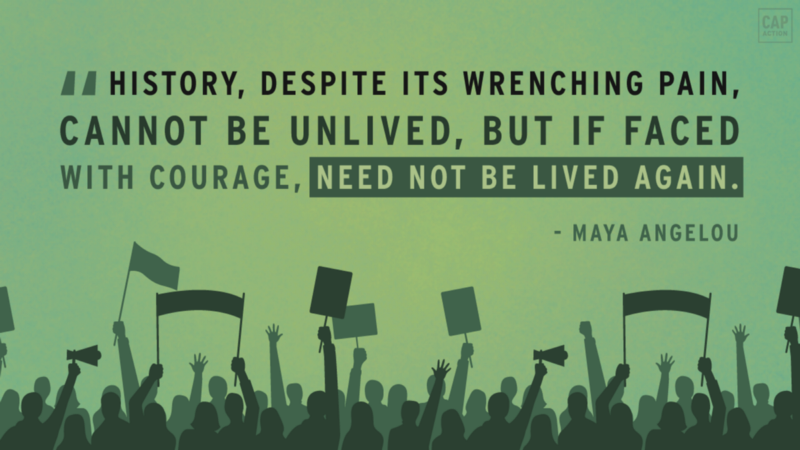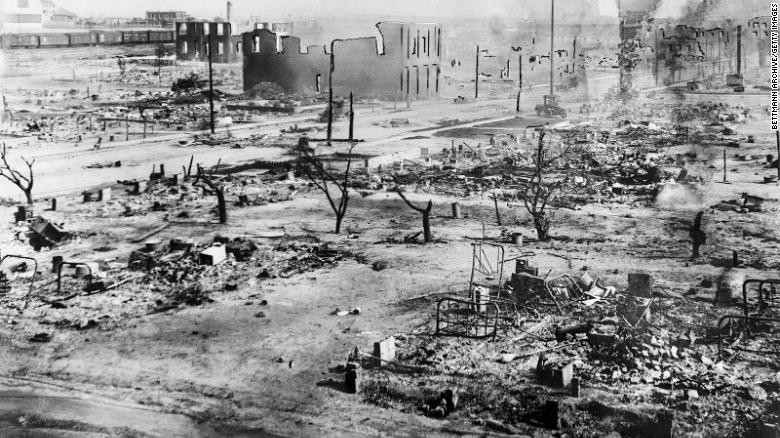This piece was originally published in the June 19, 2020 edition of CAP Action’s daily newsletter, the Progress Report. Subscribe to the Progress Report here.
In the wake of Trump’s initial plans to be in Tulsa, Oklahoma on Juneteenth, we’re taking today to reflect on the significance of both the holiday and the location.
Our goal is to use this space to give these topics the recognition they have long deserved but rarely received, and to consider the work that still needs to be done before the promise of liberation for Black Americans is truly fulfilled.
We’ve included resources throughout this issue for anyone seeking to learn more on these topics as well as specific ways for allies to support the Black community and contribute to the fight to end systemic racism.
 Share on Twitter | Share on Facebook
Share on Twitter | Share on Facebook
JUNETEENTH
One hundred and fifty five years ago today, Union troops arrived in Galveston, Texas and announced to the local enslaved people that the Civil War had ended — and, more importantly, that they were free. This happened more than two years after Lincoln’s 1863 Emancipation Proclamation for reasons that are still unclear to this day. Theories suggest Union messengers could have been killed on their way to Texas, or that enslavers may have intentionally withheld the news in order to hold on to their captive workforce and continue exploiting their free labor for as long as possible.
Thus, June 19 became Juneteenth — an annual holiday to celebrate the emancipation of enslaved Black people and the end of slavery in the United States. Today Juneteenth is celebrated across the country with parades, barbecues, family gatherings, religious services, and more. Juneteenth is a day to reflect on the past, to celebrate the freedom for which enslaved Black Americans fought hard, and to consider both the progress made since 1865 and the many barriers that Black Americans still face today.
Up until now, Juneteenth has gone largely unrecognized by mainstream American institutions, including by the federal government and across the private sector. It’s still not a federal holiday (although it should be), and many states have yet to make it an official state holiday.
We at CAP Action are grateful that our organization is observing Juneteenth, but that’s not the case everywhere. If you don’t have today off, encourage your employer to give employees the day off next year.
One year ago today, on Juneteenth, the House Judiciary Subcommittee on the Constitution, Civil Rights and Civil Liberties held the first hearing in over a decade on reparations. By enacting reparations, our government would take the unprecedented step of concretely acknowledging the countless ways in which systemic racism has been woven into public policy over the years to discriminate against and hold Black Americans back. This hearing represented a still-ongoing shift in the way our leaders talk about race, offering a small but significant glimmer of hope that America might finally begin to remedy the ills of its past (and present).
Author Ta-Nehisi Coates testified at last year’s hearing in favor of H.R. 40, which would create a federal commission to study reparations. You can read Coates’ powerful 2014 piece, The Case for Reparations, here.
TULSA, 1921
In the early 20th century, Tulsa’s Greenwood neighborhood was home to a thriving community of successful, middle-class Black people known as Black Wall Street. Isolated from Tulsa’s white business community by segregation laws, dozens of bustling Black-owned businesses supported primarily by the community’s own residents filled the streets of Greenwood, along with more than two dozen churches and youth organizations. According to the Greenwood Cultural Center, “the district was so successful that a dollar would stay within the district an estimated nineteen months before being spent elsewhere.”
 CNN
CNN
Then, on the evening of June 1, 1921, all that changed. Thousands of white residents from the neighborhood’s south side crossed over literal train tracks to reach Black Wall Street, where they massacred hundreds of Greenwood’s Black residents. This is now known as the Tulsa race massacre. More than 1,200 businesses and homes were destroyed. To this day, many of the dead have not been identified; they lie in unmarked graves.
Remarkably, Greenwood’s residents rebuilt the town without an ounce of government support and despite each of their insurance claims being denied. Following the Tulsa race massacre, more than 100 new businesses sprung up on the recovered Black Wall Street.
The first episode of HBO’s Watchmen (2019) opens with a depiction of the 1921 Tulsa race massacre. Following the episode’s premiere, social media flooded with stories of viewers who were shocked this was their first exposure to the horrific and critical event, some even saying they’d assumed the scene was fictional at first.
The fact that Watchmen is the only reason thousands of Americans know about the horrific events of 1921 speaks volumes to the systemic problems within our education system. For those who are interested, HBO is offering all nine episodes of the series for free on their website and on demand this weekend.
On Juneteenth and every day, it’s important to remember that the burden of this fight cannot rest on the shoulders of Black Americans. White and non-Black allies need to educate themselves, stand up, speak out, and take cues from the activists and leaders who have been doing the work for years.
If these protests have taught us anything, it’s that activism works. Justice can never fully be obtained for the families of George Floyd, Rayshard Brooks, Tony McDade, Breonna Taylor, Ahmaud Arbery, or any of the other countless Black people who we’ve lost to racist violence and police brutality. Yet when enough of us refuse to be silent in the wake of these incidents, our elected officials often feel the pressure.
The officers who killed Breonna Taylor still have not been arrested. But this week, the officer who killed Rayshard Brooks was charged with felony murder. George Floyd’s killer and the three officers who stood by as Floyd died have been arrested. And a new poll of Americans’ attitudes on race paints a vastly different picture of our country compared to where we stood just a few years ago, giving us hope that this time — just maybe — might be different.
WHAT TO WATCH
Ava Duvernay’s 13th, a documentary on the continued impact of systemic racism and specifically mass incarceration, is available for free on YouTube.
Bryan Stevenson’s book-turned-movie Just Mercy is available for free on various streaming platforms for the month of June.
As we mentioned, HBO’s Watchmen, the first episode of which depicts the Tulsa race massacre of 1921, will be available to watch for free on HBO’s website this weekend. HBO is also airing a marathon of the series today at 1:00 PM EST.
WHAT TO READ
Check out CAP’s 2019 series on the legacy of systemic racism and its impact on present-day outcomes for people of color.
Read or listen to The 1619 Project, Nikole Hannah-Jones’ brilliant, Pulitzer Prize-winning dive into the legacy of systemic anti-Blackness in America starting in 1619, when the first enslaved Africans were brought to America.
The Atlantic compiled their collection of articles on racism and policing.
Equal Justice Initiative’s new report examines the 12 years following the Civil War when violence perpetrated by white leaders against Black communities created an American future of white supremacy and Jim Crow laws — an era from which our nation has yet to recover.
WHO TO FOLLOW & SUPPORT
The Advancement Project (@adv_project) provides direct, hands-on support for organized communities in their struggles for racial and social justice. Donate here.
Law for Black Lives (@Law4BlackLives) is a Black femme-led national network of radical lawyers, law students, and legal workers of color committed to building the power of the Movement for Black Lives. Donate here.
The Okra Project (@TheOkraProject) works to provide meals and mental health resources to Black transgender people in need. Donate here.
Equal Justice Initiative (@eji_org) provides legal representation to people who have been illegally convicted, unfairly sentenced, or abused in state jails and prisons. Donate here.
The National Museum of African American History and Culture (@NMAAHC) in Washington, D.C. is the only national museum devoted exclusively to the documentation of African American life, history, and culture. Donate here.
Color of Change (@ColorOfChange) works to hold police accountable and break down barriers for Black Americans. Donate here.